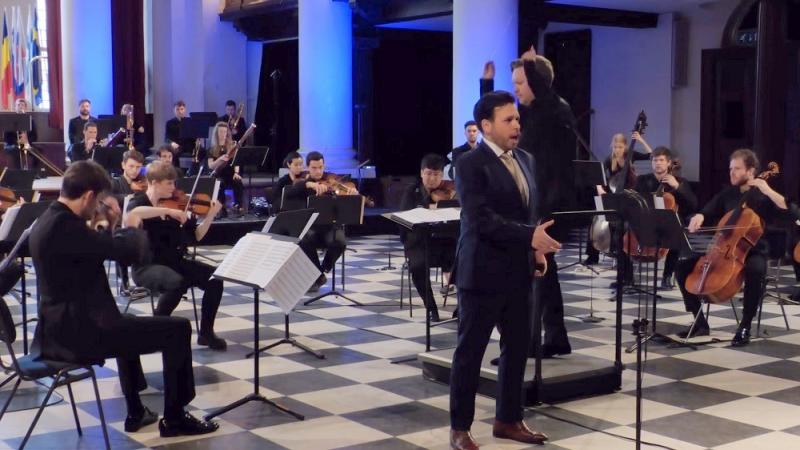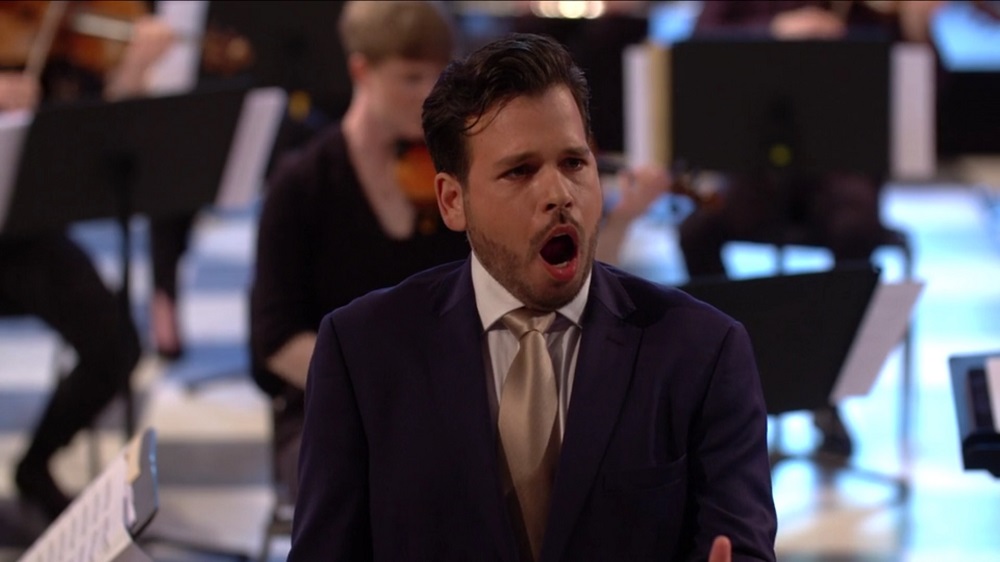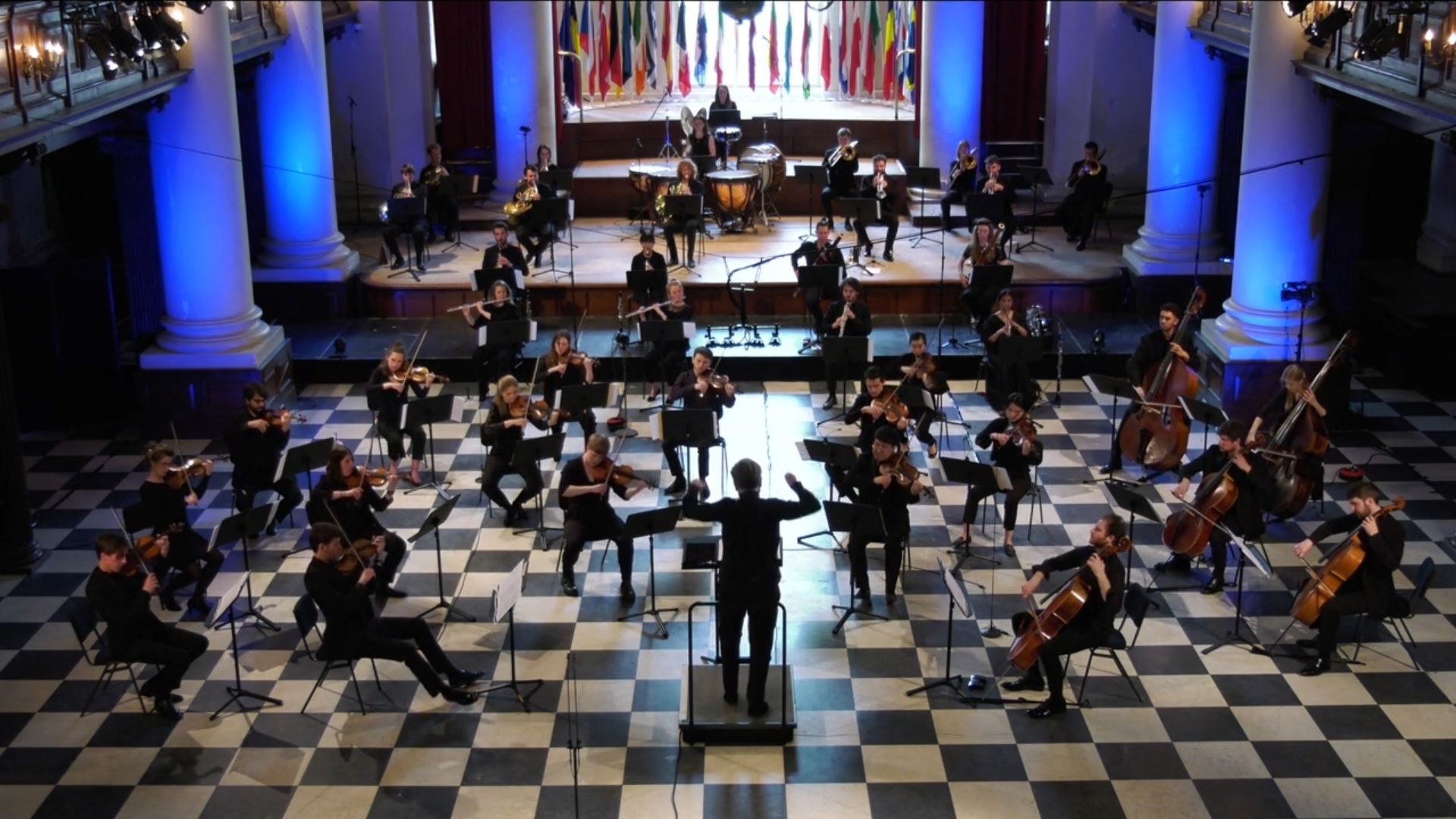Europe Day Concert, St John's Smith Square online review – celebrating in style | reviews, news & interviews
Europe Day Concert, St John's Smith Square online review – celebrating in style
Europe Day Concert, St John's Smith Square online review – celebrating in style
Portuguese tenor Luis Gomes shines bright in a lively multinational programme

We may not be in the EU any more, but geographically and culturally we can celebrate being part of Europe as much as we jolly well like.
The ensemble is from Bloxham’s eponymous festival in the north east, sporting 12 different European nationalities and a larger number beyond that continent. In its ranks you could note some of the country’s finest freelance players. Thomas Gould was the leader, Sini Simonen of the Castalian Quartet the subleader and their colleagues included bassist Adam Wynter from the Chineke! Ensemble, LSO co-principal oboe Olivier Stankiewicz and former BBC Young Musician Pete Moore on trombone, among others. Best of all, they sounded every bit as good as they should.
The livestreamed programme, in what seems to be the, er, “new normal” of concerts – an hour and a quarter, unbroken – assembled pieces from composers of assorted European nationalities on the theme of journeys, chiefly by sea or rail, but also some purely of the spirit. Spread wide and long through the space of St John’s, the distanced performers seemed accustomed to the set-up and unfazed by it, and the clear and resonant acoustic flattered them with plenty of depth.  The high point proved to be three romantic arias, dotted sporadically about, following the trajectory of the Divine Comedy by Dante, the 700th anniversary of whose death we mark this year – the ultimate journey, from Inferno via Purgatorio to Paradiso. They were sung by the young Portuguese tenor Luis Gomes (pictured above), who won the Audience Prize at the Operalia Competition three years ago. He might initially have been an appropriate choice of soloist given that Portugal currently holds the presidency of the EU Council, but proved a riveting performer. He has a sure, strong-centred tone with plenty of high-set cut-through, which he places wholly at the service of the music’s emotions. His singing is stylishly Italianate, making "O inferno!" from Verdi’s Simon Boccanegra a particular treat; Meyerbeer’s "Ô Paradis" from L’Africaine was suitably wonder-filled and "A tout mes espoirs" from Godard’s Dante a worthwhile rarity. I hope we have a chance to hear him in person again soon.
The high point proved to be three romantic arias, dotted sporadically about, following the trajectory of the Divine Comedy by Dante, the 700th anniversary of whose death we mark this year – the ultimate journey, from Inferno via Purgatorio to Paradiso. They were sung by the young Portuguese tenor Luis Gomes (pictured above), who won the Audience Prize at the Operalia Competition three years ago. He might initially have been an appropriate choice of soloist given that Portugal currently holds the presidency of the EU Council, but proved a riveting performer. He has a sure, strong-centred tone with plenty of high-set cut-through, which he places wholly at the service of the music’s emotions. His singing is stylishly Italianate, making "O inferno!" from Verdi’s Simon Boccanegra a particular treat; Meyerbeer’s "Ô Paradis" from L’Africaine was suitably wonder-filled and "A tout mes espoirs" from Godard’s Dante a worthwhile rarity. I hope we have a chance to hear him in person again soon.
Perhaps the pick-and-mix programme was trying to squeeze too many raisons d’etre into one short span, but that made it no less enjoyable. Bloxham’s opener was “The Hunt – Overture” from Sibelius’s Scènes Historiques Suite No 2, a lively choice with the composer in unusually fresh and sprightly form. Just as noteworthy was The Sea by Ester Mägi, the “first lady” among Estonian composers, now in her hundredth year; this “symphonic picture” dates from 1981. If you still need any proof that taking the trouble to perform rarely heard music by female composers can bring worthwhile pieces into the concert hall for us all to enjoy, then here you go. With rockpools of clarinet amid the sands of the strings, this sound-picture was intensely evocative and drew us in like the sweep of the tide.  Mendelssohn’s Calm Sea and Prosperous Voyage was delivered with idiomatic clarity and gusts of salty energy, followed cleverly by Elgar’s 13th Enigma Variation, which quotes the piece, with the side-drum mimicking a steam paddle, and a missing person – perhaps the composer's first love, the one that got away to New Zealand – in the whispering clarinet, played by the splendid Anna Hashimoto.
Mendelssohn’s Calm Sea and Prosperous Voyage was delivered with idiomatic clarity and gusts of salty energy, followed cleverly by Elgar’s 13th Enigma Variation, which quotes the piece, with the side-drum mimicking a steam paddle, and a missing person – perhaps the composer's first love, the one that got away to New Zealand – in the whispering clarinet, played by the splendid Anna Hashimoto.
A Strauss polka, Vergnügungszug (Pleasure Train), was fleeter and considerably more pleasurable than many UK trains; and the last movement of Dvořák’s New World Symphony provided a meaty climax before the orchestra played in its anthem from the “Ode to Joy” from Beethoven’s Ninth. It sounded somewhat wistful. Right now, plenty of fishermen – and innumerable artists too – are longing for the sort of prosperous voyages that appear to be gone forever.
The future of Arts Journalism
You can stop theartsdesk.com closing!
We urgently need financing to survive. Our fundraising drive has thus far raised £49,000 but we need to reach £100,000 or we will be forced to close. Please contribute here: https://gofund.me/c3f6033d
And if you can forward this information to anyone who might assist, we’d be grateful.

Subscribe to theartsdesk.com
Thank you for continuing to read our work on theartsdesk.com. For unlimited access to every article in its entirety, including our archive of more than 15,000 pieces, we're asking for £5 per month or £40 per year. We feel it's a very good deal, and hope you do too.
To take a subscription now simply click here.
And if you're looking for that extra gift for a friend or family member, why not treat them to a theartsdesk.com gift subscription?

Add comment